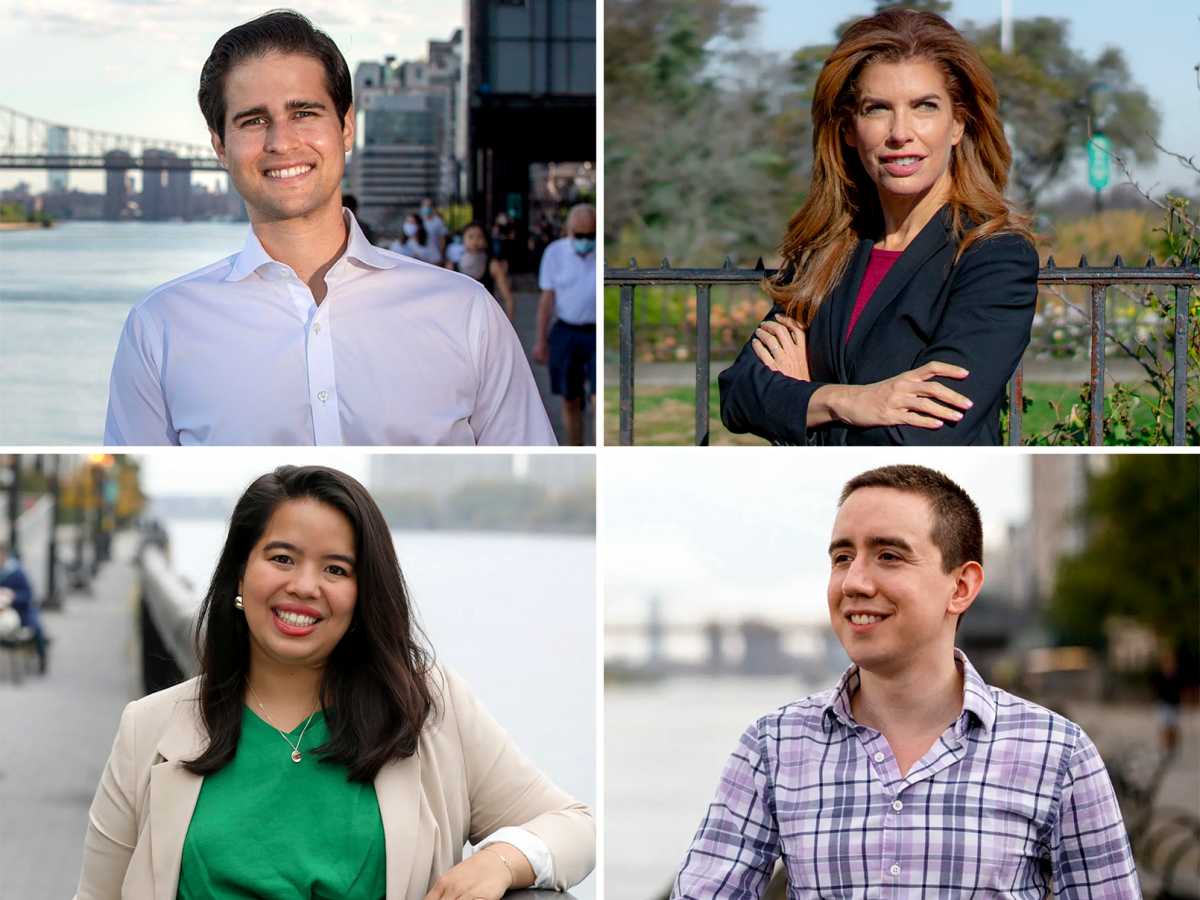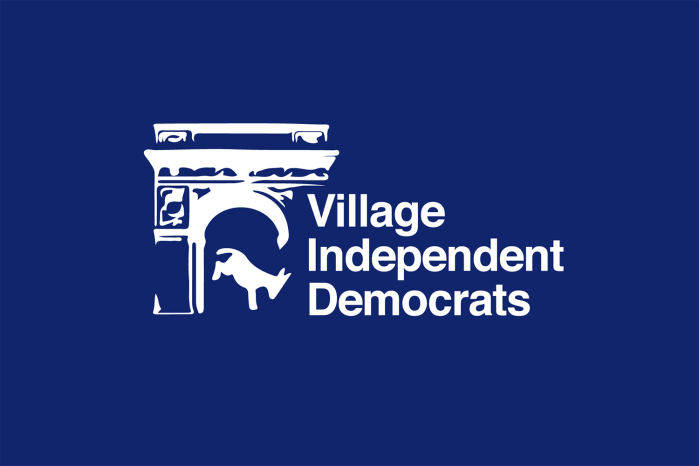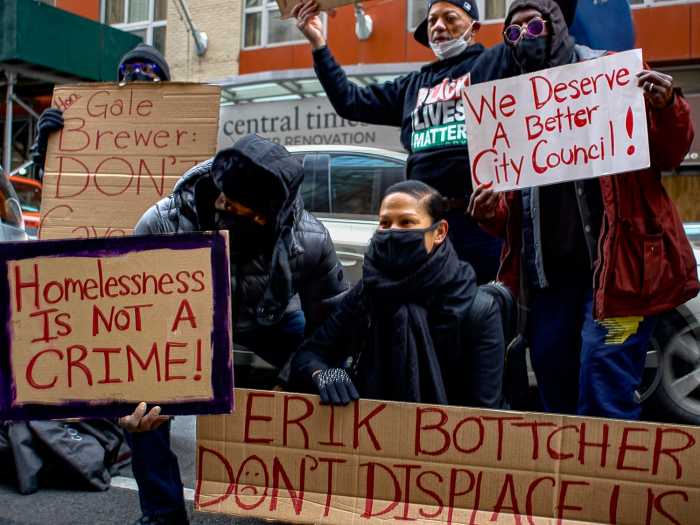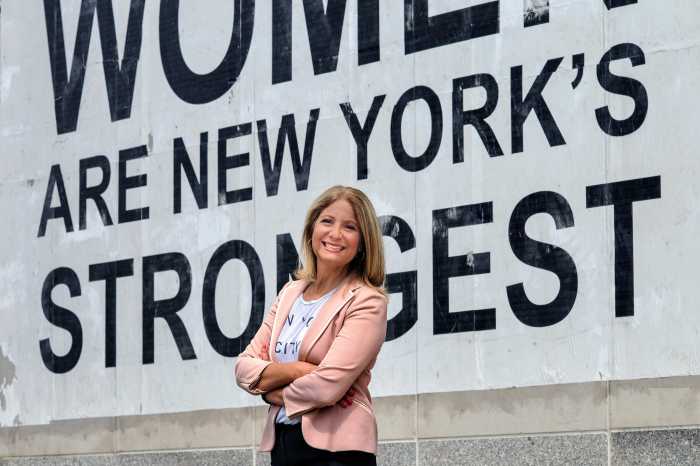Since the pandemic and the ensuing economic crisis started, the City Council’s Fifth District (Upper East Side, Yorkville, Lenox Hill, Carnegie Hill, Roosevelt Island, Midtown East, Sutton Place, El Barrio) has seen an uptick in homelessness with questions emerging over how best to provide for them.
Four of the candidates angling to succeed the district’s outgoing councilmember, Ben Kallos (D), offered their proposals over how to resolve the issue.
Julie Menin (D) offered a multi-pronged solution to the issue. She highlighted the need for both immediate relief for homeless people and larger-scale investment to prevent people from becoming homeless in the first place.

“I am very proud that in my most recent role as the City’s Census Director, I led the charge to ensure our homeless population receives the resources they desperately need,” said Menin. “I negotiated an historic agreement between the City’s Department of Social Services and the US Census Bureau that for the first time enabled the counting of every homeless person, both on the streets and in shelters, to ensure NYC would get the critically needed funding to help address the homeless in our city – a problem that has only been exacerbated by the pandemic and its associated unacceptable levels of unemployment and mental despair.
“Long term we need more affordable housing and programs that help keep people in their homes, and I will prioritize that. Reforming our ULURP process to ensure we are building more affordable housing is critical. Short term we need to help the homeless come off the streets and into supportive housing environments where they are connected with job training and job placement services, mental health services, and other social services to address their acute particular needs. We need to build more supportive housing that provides these critically needed social services.”
Kim Moscaritolo (D) offered up a similar solution, based around attacking the problem at its root.

“With homelessness at epidemic levels, it’s imperative that the city provide necessary homeless services to those in need. We need to shift from a shelter model to a supportive housing model, with direct access to on-site services, including job training, mental health counseling, and child care. We must invest in social services, including homeless outreach social workers, who can work with homeless individuals to connect them with available services. We must also prioritize family stability by working to keep families in their communities, and children in their schools. Finally, we must provide more state and city funded housing vouchers, and crack down on building owners and managers who refuse to accept these vouchers.”
Tricia Shimamura (D), a social worker and Second Vice Chair of Community Board 8, touted her work in allowing the construction of a “safe haven” on 91st Street for homeless people in the district.

“We need to be doing much more to protect and support unhoused New Yorkers, and for our community, this safe haven is a great step forward in providing safe, reliable housing and comprehensive care for those who need it most,” she said. “Throughout this process, I will continue to push for community input and oversight of the shelter’s construction and operations, as we know any construction or new housing development has an impact on the surrounding community.”
“As we fight to ensure every New Yorker has access to permanent safe and affordable housing, it’s clear that the next City Council must take immediate and meaningful actions to address housing insecurity across all five boroughs.”
Chris Sosa (D), an advocate, former New York State Senate staffer and former journalist, praised Kallos’ handling of the matter, and vowed to continue his work.

“I admire the work of Council Member Ben Kallos in co-founding the ETHOS Homeless Taskforce with Sen. Liz Krueger and Manhattan Borough President Gale Brewer to build supportive housing and shelters in our district,” he said. “I strongly support the Doe Fund’s work around the district and am proud that 306 individuals who would otherwise be on the streets in this freezing cold are in safe shelter at the Bentley Hotel. I also want to express my gratitude to the newly formed UES Mutual Aid for its proactive leadership in helping to ensure some basic needs are met for those experiencing homelessness while providing a link between community members, service providers and shelter residents.
“Until every person experiencing homelessness has a sustainable path out of the homelessness cycle, the crisis will continue. Public and affordable housing, comprehensive mental health and addiction services, living-wage jobs and accessible social services are some of the key elements of that holistic path.”
Finally, Billy Freeland (D), an attorney and activist, offered a four-point plan to handle homelessness.
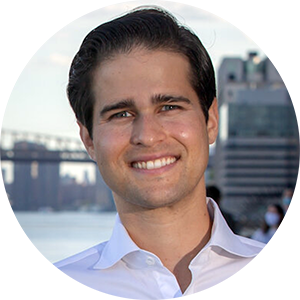
“First, we need more supportive housing,” he said. “I live 500 feet from permanent supportive housing run by the Doe Fund—it is very successful and you would not know it’s there if you walked past it. I was also very proud to vote in favor of a proposed 88-bed safe haven run by Goddard Riverside. Programs like these, which pair a reliable roof over one’s head with any necessary services (job training, health care, and more) are central to how we can tackle homelessness, especially chronic homelessness.
Second, we must increase the size of vouchers provided to help individuals and families find housing. The CityFHEPS voucher is failing families and individuals because the voucher’s value falls far below the median asking rent almost anywhere in the City. I am in complete support of Intro 146, which would raise the voucher to fair market rent and move thousands into permanent housing. We need other changes to how the Department of Homeless Services operates.
Third, we need major changes to how our City’s housing and land use policies. Current policies favor developers, and as a result we have seen luxury developments spring up all across District 5, Manhattan, and our City. I support comprehensive planning, and requiring developers to build genuinely affordable housing.
Finally, I think housing is health care. We know that having safe, consistent, reliable housing improves health. But we also need to make robust investments in public health for anyone experiencing homelessness or coming out of the shelter system. In the coming weeks, I will be releasing a major new mental health policy, with a focus on expanding access to mental health care, destigmatizing mental health care, creating non-police teams to address mental health calls, protecting and expanding inpatient mental health care, and accelerating the timeline for the creation of supportive housing under the NYC 15/15 initiative,” he said.


